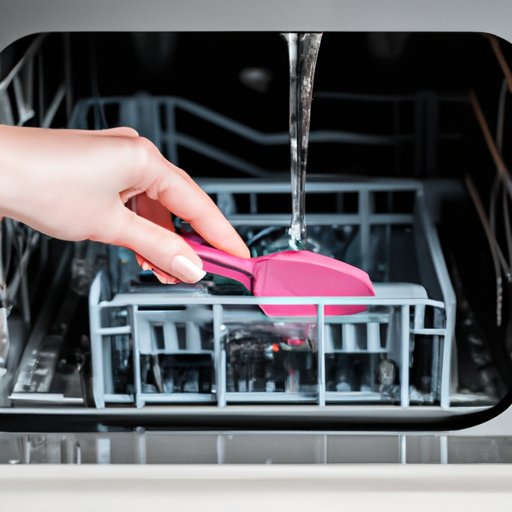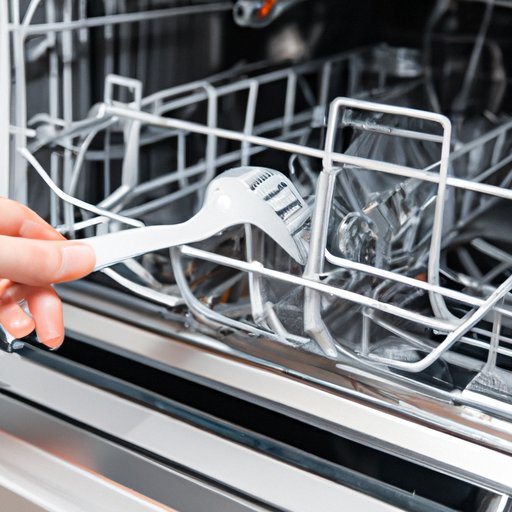
I. Introduction
Having a clogged dishwasher can be incredibly frustrating, especially when dirty dishes start piling up in your kitchen. However, this is a common issue many homeowners face. Luckily, unclogging a dishwasher can often be done with just a few simple steps, saving you time and money.
This DIY guide will take you through the process of unclogging your dishwasher, from cleaning the filter to running your machine with vinegar. We’ll also provide troubleshooting advice, expert tips, and natural remedies for those who prefer to avoid harsh chemicals.
II. 5 Simple Steps to Unclog Your Dishwasher: A DIY Guide
Before calling a plumber, try our simple guide to unclogging your dishwasher:
A. Step 1: Clean the Dishwasher Filter
The dishwasher filter is designed to catch food particles and other debris that may clog your machine. Over time, this filter can become dirty and cause draining problems.
To clean the filter, remove it from your dishwasher and rinse it under hot water using a soft brush or toothbrush. Once clean, reattach the filter to your machine.
B. Step 2: Remove Blockages from Spray Arms
The spray arms are responsible for distributing water throughout your dishwasher. If they become clogged, they can’t function properly and lead to poor cleaning and draining.
To remove blockages, detach the spray arms from your dishwasher and rinse them under hot water. Use a toothpick or wire brush to clear any stubborn build-up.
C. Step 3: Clean the Dishwasher Spray Arm
If your dishwasher’s spray arm becomes clogged with debris, it may not properly clean the dishes. To clean it, remove the spray arm from the dishwasher and soak it in a solution of vinegar and water for about 30 minutes. Once soaked, rinse it under hot water and reattach it.
D. Step 4: Check the Drainage Hose
If your dishwasher is not draining properly, the drainage hose may be clogged or blocked. To check the hose, turn off the power to your dishwasher and disconnect it. Use a plumber’s snake to clear any blockages. Reconnect the hose and turn on your machine to test for proper drainage.
E. Step 5: Run the Dishwasher with Vinegar
Vinegar is a natural cleaner and can help get rid of built-up grease and grime in your dishwasher. To use, fill a cup with vinegar, place it on the top rack of your dishwasher, and run a cycle on the hottest setting. This will clear any remaining build-up and leave your dishwasher smelling fresh and clean.
III. Troubleshooting 101: What To Do When Your Dishwasher Gets Clogged
Even after following the above steps, you may still experience problems with your dishwasher. Here are some common issues and solutions:
A. Loud noises
If your dishwasher is making loud noises, it could be due to a clogged or malfunctioning pump, motor or fan. Call a professional for help.
B. Water backup in sink or dishwasher
If water is backing up in your sink or dishwasher, it’s likely due to a clog in the sink’s drain or garbage disposal. Check these areas for blockages and clear them out before running your dishwasher again.
C. Dishwasher not draining
If your dishwasher is not draining, it could be due to a clogged drain or air gap. Check these areas for blockages and clear them out as necessary. You may also need to replace your dishwasher’s drain pump.
D. Dishwasher not cleaning dishes properly
If your dishwasher is not cleaning dishes properly, it could be due to a faulty spray arm or a clogged filter. Follow our previous steps to clean these areas and improve your dishwasher’s performance.
IV. How to Avoid Dishwasher Clogs and Keep Your Kitchen Clean
Preventing dishwasher clogs is easier than fixing them. Here are some tips to keep your dishwasher and kitchen running smoothly:
A. Preparing dishware
Before loading your dishes, rinse any large food particles and debris off of them. This will prevent build-up in your dishwasher’s filter and spray arms.
B. Cleaning the dishwasher after use
After running a load, wipe down your dishwasher’s interior with a damp cloth and check for any leftover food debris or residue. This will keep your machine running smoothly and prevent any unwanted smells.
C. Regular maintenance
Follow our simple guide to cleaning and maintaining your dishwasher on a regular basis. This will prevent build-up in your machine and keep it functioning properly for years to come.
D. Do’s and don’ts for dishwasher use
Do use a rinse aid to improve drying performance and prevent streaking. Don’t overload your dishwasher, as this can lead to poor cleaning and draining. Do use the hottest water setting possible to sanitize your dishes, and don’t put delicate items in the dishwasher that can become damaged.
V. Expert Tips for Unclogging a Dishwasher Without Calling a Plumber
If you’re still having trouble unclogging your dishwasher, here are some expert tips to try:
A. Using plumbing snakes
A plumbing snake is a helpful tool for removing blockages from your dishwasher’s drainage hose or air gap. It can also be useful for clearing blockages from your sink’s drain or garbage disposal.
B. Using boiling water
Boiling water can help unclog a greasy or oily buildup in your dishwasher’s drains. Simply pour the hot water down the drain and let it sit for a few minutes before running your machine as usual.
C. Using baking soda and vinegar
Mixing baking soda and vinegar can create a powerful cleaning solution that can help clear clogs from your dishwasher. Pour a cup of vinegar into your dishwasher’s bottom and sprinkle a cup of baking soda on the top rack. Run a cycle on the hottest setting to finish off.
VI. Natural Remedies for Unclogging Your Dishwasher: Say Goodbye to Chemicals
If you prefer natural remedies, try using these items to unclog your dishwasher:
A. Baking soda and vinegar
Mixing baking soda with vinegar creates a powerful cleaning solution that can help remove blockages from your dishwasher.
B. Salt and baking soda
A mixture of salt and baking soda can also be used to unclog your dishwasher. Mix a cup of both ingredients together and pour into the bottom of your dishwasher. Run a cycle on the hottest setting.
C. Lemon juice and vinegar
For a fresh-smelling dishwasher, mix equal parts lemon juice and vinegar and pour into the bottom of your machine. Run a cycle on the hottest setting for best results.
D. Alka-Seltzer
Surprisingly, Alka-Seltzer can also be used to unclog your dishwasher. Simply drop a couple of tablets into the bottom of your machine and run a cycle on the hottest setting.

VII. What Not To Do When Unclogging Your Dishwasher: Common Mistakes and How to Avoid Them
While trying to unclog your dishwasher, make sure to avoid these common mistakes:
A. Pouring grease or oil down the dishwasher
Grease and oil can cause clogs and create unpleasant smells in your dishwasher, so avoid pouring them down the drain.
B. Overfilling the machine
Overloading your dishwasher can lead to poor cleaning and draining, so make sure to follow its recommended capacity.
C. Using chemical drain cleaners
Harsh chemicals can damage your dishwasher’s interior and cause further build-up, so use natural remedies instead.
D. Taking apart the dishwasher unnecessarily
Unless you’re a skilled professional, avoid taking apart your dishwasher’s interior as this can cause more damage and lead to costly repairs.
VIII. Conclusion
Unclogging a dishwasher can be a straightforward process, and with a little bit of effort and know-how, you can avoid the expense of hiring a plumber. Follow our simple guide to keep your dishwasher running smoothly, use our troubleshooting tips to fix any problems, and avoid common mistakes to prevent clogs from occurring. With regular maintenance and natural remedies, you can keep your kitchen clean and functional for years to come.




